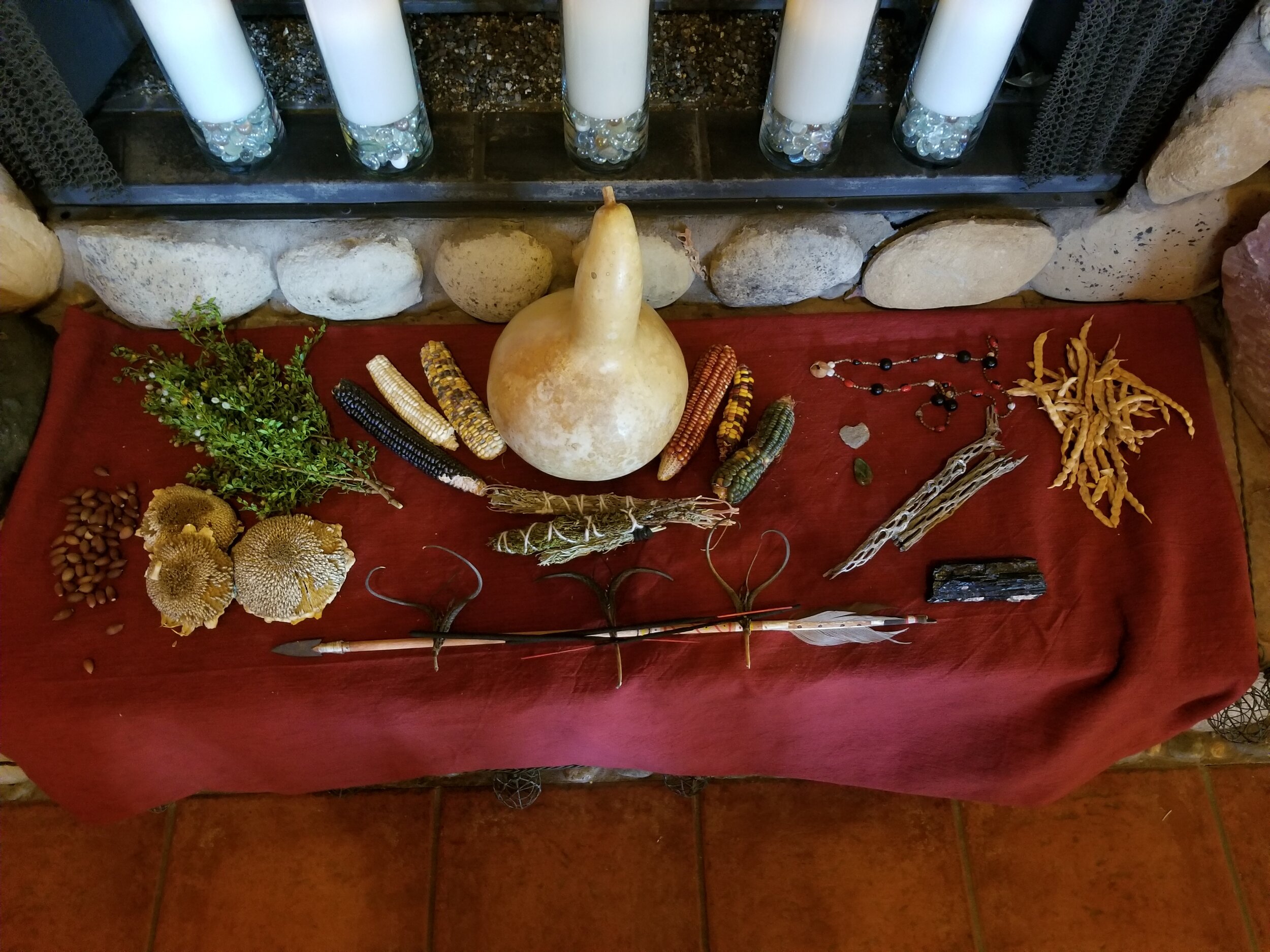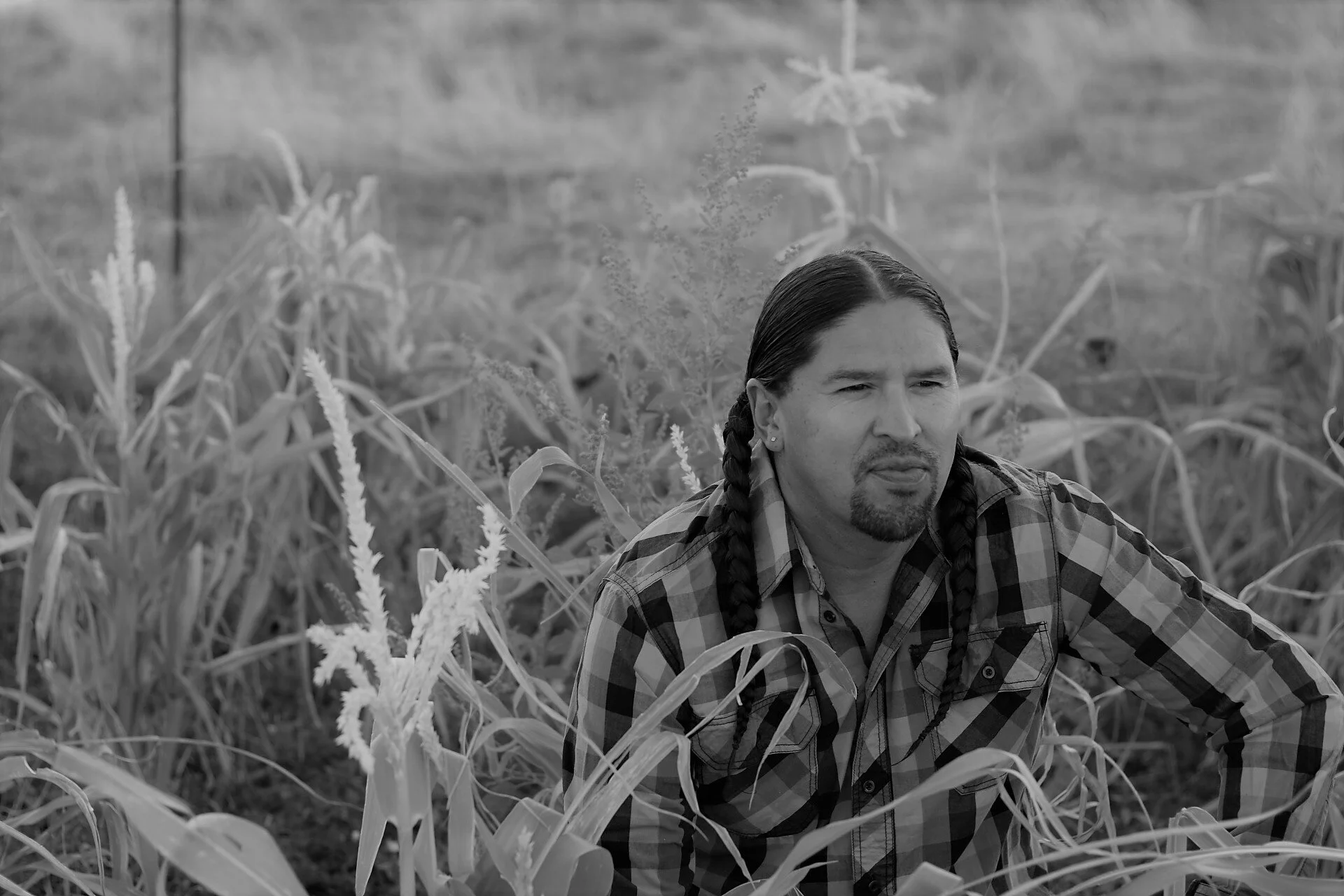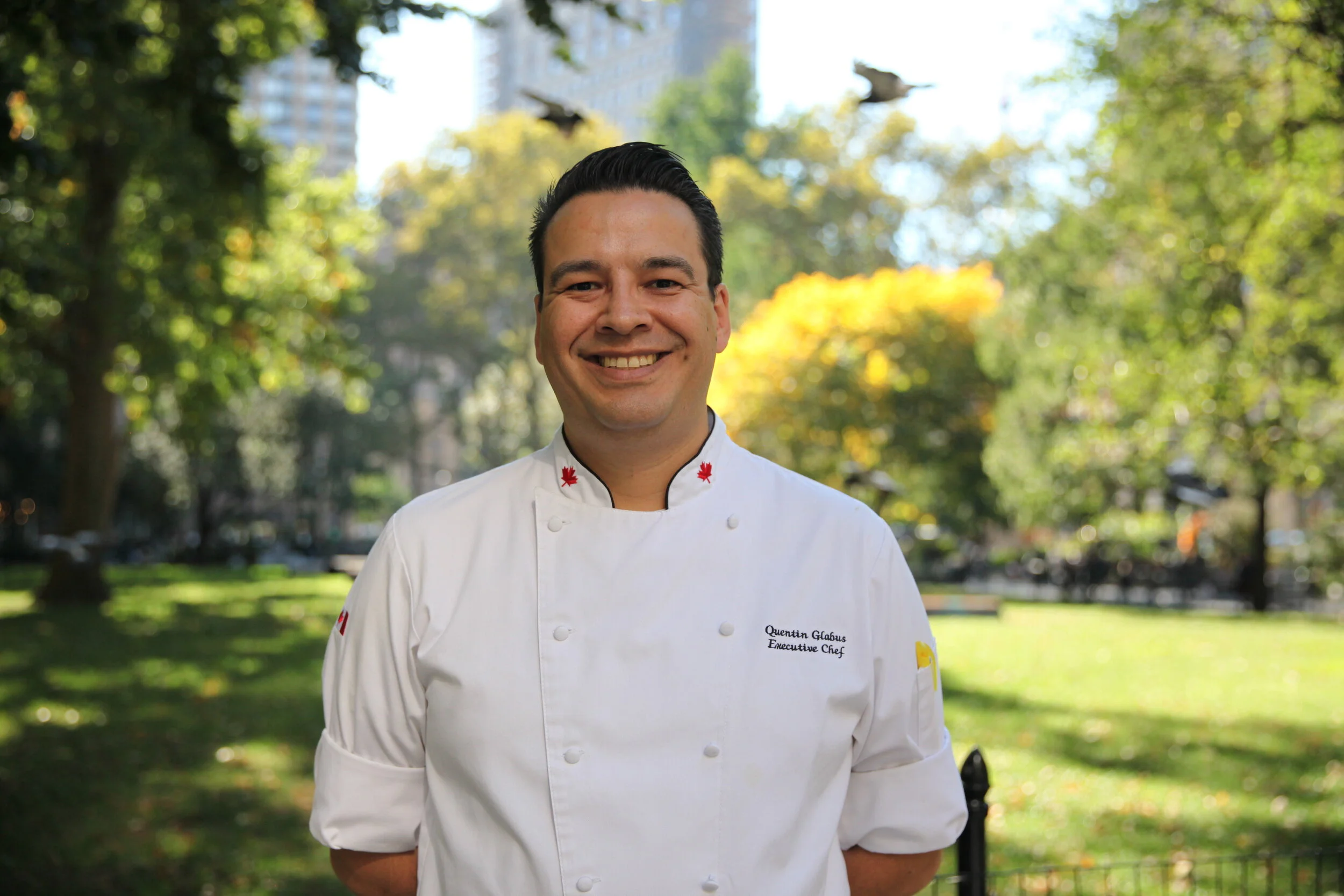
who we are
-
Karlos Baca
M. Karlos Baca (Tewa/Dine/Nuchu) is an Indigenous Foods Activist from the Southern Ute Nation. He is the founder of Taste of Native Cuisine, which was created alongside the Southern Ute Cultural Center and Museum, to promote traditional Indigenous Foodways in the community and has grown over the last decade to include work with Tribal Nations across the country, the founder of 4th World Farm which is focused on pre-colonial foods and agricultural systems of the high desert region of the southwest, and is a co-founder of the Indigenous food activist group the I-Collective which uses Indigenous Foodways as a medium to combat structural white supremacy and continued warfare against Indigenous people. Most importantly he is a son, father, uncle, and grandfather.
-

Taelor Barton
Taelor Barton (Cherokee Nation) is a Indigenous Culinarian that hails from Eastern Oklahoma. She studied culinary arts at Tulsa Technology Center in Tulsa, OK where she trained and cooked competitively, later attending OSU-IT for Applied Sciences in Culinary Arts in Okmulgee, OK.’
Taelor has always been connected to her indigenous nation by connecting with her elders, having blissful childhood memories going to native events and spending time with the foods outside in the countryside.. After the loss of her grandmother, Edith (Traditional Dressmaker, Cook, and Cherokee National Treasure) she began to weave indigenous food into her professional training as restaurant cook and chef.
Now, she cooks for her bigger native family in community events, workshops, and dinners in her home state and beyond. Wado to the greater indigenous family of this land!
-

Diana Bird
Diana Violet Bird (Cree/nehiyawak First Nations originally from Montreal Lake, Saskatchewan, Canada) is an Indigenous Food Sovereigntist and Social Worker. She is the author of the Indigenous cook book, From The Birds: A First Nations Cook Book. She is the owner of Bird’s Kitchen Catering Company and has been using Indigenous foods in her cuisine over many years. She graduated with a Psychology from the University of Saskatchewan as well as completed the 4-year Indigenous Social Work degree program at the First Nations University. She is currently the Holistic Wellness Worker at Muskoday First Nation and also sits on the Board of Directors for the Montreal Lake Cree Nation Urban Services Inc, where she plays a large role in Food Security during COVID as well as Mental Health and Wellness programming. She in featured on the documentary series “Flat Out Foods” by the Author Jennifer Sharp. Diana is also featured in Jennifer Sharp’s book called Flat Out Saskatchewan.
-

Twila Cassadore
Twila Cassadore (San Carlos Apache Tribe) has been working with San Carlos Apache, White Mountain Apache, and Yavapi peoples for the past 25 years, conducting interviews with elders to bring information back into the community to address health and social problems. Twila described the importance of foods like grass seeds and acorn seeds to the diets of Apaches before people were moved onto reservations and became reliant on rations, and later, commodities.
-

Liz Charlebois
Liz Charlebois is an Abenaki educator, artist, and leader. She was Chair of the New Hampshire Commission on Native American Affairs from 2013-2016, and is an accomplished basket maker, bead worker, dancer, and farmer. Liz's focus is growing and preserving northeastern indigenous crops. She has established a seed library dedicated to those seeds. Liz uses the food she grows in many indigenous dishes, both traditional and contemporary. She is a member of the younger generation of Abenaki people who are working to preserve and revitalize the culture, history, and identity of our original inhabitants.
-

Trennie Collins
Trennie Collins (Southern Ute) is a Journalist with the Southern Ute Drum, and Public Relations Coordinator for the Southern Ute Indian Tribe. They are also the co-founder of an LGBTQ+ youth group in Ignacio; Southwest Rainbow Youth, are a member of NAJA (the Native American Journalist Association), Society of Professional Journalists, and Colorado Journalist Association. Trennie joins I-Collective as Creative Director for ‘A Gathering Basket’.
-

Shannon Dosela
Shannon Dosela is a proud member of the San Carlos Apache Tribe. He currently resides on the San Carlos Apache Indian Reservation, which where he's lived all his life. Shannon decided to further his education after high school and received a degree in culinary arts from the Le Cordon Bleu. He is currently employed as a line cook with the San Carlos Apache healthcare corporation. Shannon is also a harvester learning to gather different indigenous foods, which his Apache ancestors gathered and is learning to use modern and traditional healthy cooking methods to help his people.
-

Neftalí Durán
Neftalí Duran is a community cook, advocate, educator, and organizer, working towards an equitable food system and building a network of Indigenous food leaders. He is a former Salzburg Global Fellow and co-founder of the I- Collective.
Neftalí’s work is informed by his own experience as an Indigenous and formerly undocumented migrant worker and 20 years of experience in the restaurant and food industry as chef, baker, and small business owner. He engages in grassroots work and advocacy regarding Indigenous culinary traditions, the effects of migration on people and food, and the environment. His interests include documenting the culinary traditions of the different regions of Oaxaca, Mexico, reclaiming the roots and culture of the original peoples of the Americas, having conversations about the impact of colonialism in our communities in regards to traditional food-ways, and engaging in conversations about the impact of climate change on frontline communities.
-

Hillel Echo-Hawk
Hillel Echo-Hawk (Pawnee and Athabaskan) was born and raised in the interior of Alaska, around the Athabaskan village of Mentasta-home to the matriarchal chief and subsistence rights activist, Katie John. Watching John and other Indigenous Peoples fight for food sovereignty, as well as seeing her mother strive to make healthy, home-cooked meals for her and her six siblings has given Hillel a unique and important perspective on diet and wellness.
Hillel has a passion for local, ethically sourced and sustainable foods, all through an Indigenous lens and perspective. Echo-Hawk is dedicated to the food sovereignty of Native peoples and is committed to empowering all Indigenous Peoples by increasing knowledge of an access to traditional diets and foods. Hillel believes that food should feed not only the body, but the spirit and midshipmen's of the community. Her unique positioning and experience as an Indigenous person is making Chef Echo-Hawk a bright and rising voice in the culinary landscape.
After receiving her Bachelor's degree in Culinary Arts from Seattle Central College, Echo-Hawk has been working as a chef in some of Seattle's most innovated and popular restaurants for several years. She has also worked as a private chef, catering various events form the local Native non-profits and Native community events with pre-colonial, Indigenous meals. Hillel is a sister, aunt, daughter, and active member of her community.
-
Quentin Glabus
Quentin Glabus (Frog Lake Cree First Nations) graduated from the Culinary Arts program at N.A.I. T. in 2000 and received his first international job at Walt Disney World. His cooking has taken him around the world, where he has held the position of Executive Chef to the Ambassador at the Embassy of Canada in Tokyo, Japan (2008-2009) and Beijing, China (2012-2013) He was also the Canadian Guest Chef representative to the Canadian Trade Office in Taipei, Taiwan (2011-2012).
Quentin spent three years in Rio de Janeiro, Brazil (2014-2017) where he represented Canadian First Nations cuisine with the Consulate General of Canada. He headed the Canadian Olympic culinary team as a Private Chef. In March 2017, Quentin worked with the Canadian High Commission to Singapore, assisted with celebrating Canada's 150th Anniversary, and traveling through Southeast Asia including Manila, Singapore, and Vientiane showcasing First Nations cuisine. Quentin also took part in the World Gourmet Summit 2017 in Singapore as the Canadian Master Chef representing First Nations cuisine. He currently resides with his wife in New York City and looks forward to continuing his growth in the culinary industry as well as his study of First Nations culture and food. Check out his work online on Wordpress, Instagram, or his Facebook page Chef Quentin Glabus, Private Dinners.
-

Tashia Hart
Tashia Hart (Red Lake Anishinaabe) is an award-winning author and illustrator of Gidjie and the Wolves (Not Too Far Removed Press, 2020) and Girl Unreserved (2015). Forthcoming works include Native Love Jams, a romantic comedy (early 2022), and Modern Orphan, a paranormal thriller (late 2022). Her new cookbook The Good Berry Cookbook: Harvesting and Cooking Wild Rice and Other Wild Foods was recently released by the Minnesota Historical Society Press on September 21, 2021. She’s the illustrator of 3 books in the Minnesota Native American Lives series(Wise Ink Creative Publishing, 2020), and her short works include recipes, essays, poetry, and short stories for various publications. She lives at Onigamiinsing (Duluth, MN) with her husband, two cats, and a turtle.
www.tashiahart.com
-

Kirsten Kirby-Shoote
Kirsten Kirby-Shoote is a Tlingit food activist, chef and urban farmer originally from Portland, Ore. In 2015, she moved to Detroit in order to explore Indigenous food sovereignty and how it's integrated into urban landscapes. Kirsten is dedicated to providing the community with access to traditional foods/medicines, her agriculture project (Leilú Gardens) mission is to cultivate relationships with our plant relatives and help heal the wounds of ancestral trauma. She also hosts pop-up dinners in Detroit to raise awareness of the local Indigenous food-movement and creating a more equitable food system.
-

Brit Reed
Brit Reed (Choctaw) credits her initial love of cooking and food to her parents. While working in their family's camp kitchen, she began learning from her aunt the importance of cooking for The People in a good way and to embrace traditional women's roles. These experiences led her to pursue learning about traditional foods & medicines. Throughout her time at The Evergreen State College earning her BA and MPA with a concentration in Tribal Governance, she focused her studies on tribal food (in)security, food sovereignty, tribal food policy, and the effects of food on the health of our tribal communities. In 2015, she founded Food Sovereignty is Tribal Sovereignty - a native based group with a large membership base that are engaged in all facets of the the Indigenous Food Revitalization Movement throughout the Americas and parts of Europe. She is currently attending Seattle Culinary Academy. Additionally, she is working with Choctaw Nation Historian, Ian Thompson and Choctaw Nation members to learn more about traditional Choctaw foods that were eaten pre and post contact. At this time she is working with the Tulalip Health Clinic's Diabetes Program to teach healthy cooking classes to the community.
-

Jessica Sargent
Jessica Sargent is a mother and photographer of the Snipe clan from the Akwesasne Mohawk Nation. She has been documenting the beauty and struggles of Akwesasne and Indigenous life since she was a teen. Jessica graduated from the Hallmark Institute of Photography in 2005. Since then, she has had the opportunity to chronicle the many events, protests, vigils, and everyday life in and around Akwesasne including the Idle No More march in Ottawa, fundraising efforts for Standing Rock, and the Kanienkeha Codetalkers event honoring Mohawk Veterans. She is the owner of Ink & Paper Photo. When she isn’t shooting, she works with the Friends of the Akwesasne Freedom School, the fundraising arm of one of the oldest Indigenous language immersion schools in North America. Visit her website here.
-

Erica Scott
Erica Scott (Lenape) is experienced in community organizing, advocacy, and fundraising. She is a dedicated anti-sexual/domestic violence and reproductive justice advocate who has worked with tribal communities in New England, North Carolina, and Oklahoma. Erica has served on the boards of American Indian Women of Proud Nations, the Native American Alumni of Harvard University, and the Carolina Native Alumni Club (UNC-Chapel Hill). She is an avid women's southern traditional dancer and gardener.
-

Kristina Stanley
Kristina Stanley ( Ojibwe, Red Cliff ) attended Northland College where she studied Ecopsychology – with a focus on Horticulture Therapy. Her studies focused around food ecosystems, food access, and how an individual’s relationship with food and the natural environment affects both physical and mental health. Finding disparities between chefs and producers and event organizers, she continued her studies, completing the Meeting and Event Management Program at Madison College.
Kristina has worked in the food service industry for over 20 years, specializing in Catering, Event Management, Pastry, and Nutrition. She is a business owner (Abaaso Foods), and works as an independent contractor planning events and conferences, and also shares her knowledge and experience as an Adjunct Instructor in the Hospitality Program at Fox Valley Technical College.
She has also worked as a chef and marketing assistant with the Intertribal Agriculture Council, teaches community cooking classes, volunteered for many years with school garden and chef in the classroom programs and, and has assisted in planning various food sovereignty focused summits, conferences, and pop-up events.
Kristina is currently the Food & Culinary Program Coordinator at NAFSA, and the Operations Manager for the I-Collective
-

Camren Stott
Camren Stott is an enrolled member of Little Traverse Bay Band of Ottawa Indians and Owner of Jiibaakwaan Foods, an indigenous catering/dinner party agency that specializes in decolonized modern cuisine. He is currently pursuing his BA in Environmental Sustainability/Food Sustainability. Food justice plays a vital role in Cam’s life and he aspires to make healthy, traditional foods more accessible to his native community.
-

Brian Yazzie
Brian Yazzie (aka Yazzie The Chef) is Navajo from Dennehotso, AZ on the Navajo Nation. Chef Yazzie has a degree in Associate in Applied Science (AAS) in Culinary Arts and is continuing his education to pursue a degree in Hospitality Management from Saint Paul College. He caters private events and provides cooking demonstrations utilizing healthy Indigenous foods free of colonial ingredients. As the Executive Chef at Gatherings Cafe, he enjoys collaborating with other cooks and chefs on Indigenous food projects. Chef Yazzie aspires to explore old and new delectable Indigenous cuisine creations and educate all populations on the health benefits and possibilities of an Indigenous diet.
-

Sewa Yuli
Sewa Yuli (they/them) is a queer, community cook, Student Midwife, bodyworker, and parent. Rooted in Mexican curanderismo, Traditional Mexican postpartum care, and Food Justice advocacy, Sewa is the founder of Mi Xantico (pronounced chan-tico). In addition to the aforementioned services, they provide 1:1 meal prep services, postpartum nutritional support, catering, cooking classes and more.
Centered around Ancestral Foods, Sewa utilizes culinary medicine to promote healing, connection to tradition and health autonomy in all their practices.n goes here

